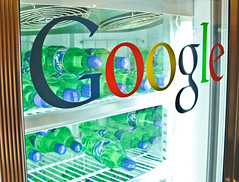A couple of weeks back, Atlantic Media’s business news outlet, Quartz, broke the story that Google’s famed “20%” time,” under which employees were supposedly encouraged to take up to 20% of their time to work on things not tied to their main position, was “as good as dead.” This perk has, of course, become a leitmotif whenever the table talk gets around to the subject of innovation — “We should all be like Google; they let their employees use 20% of their time to work on whatever they want.” Now, it would appear — at least if the initial Quartz piece is to be believed (and it spawned a great deal of contemplative thumb-sucking and follow-ups in the tech press) — that Google is getting more interested in having people just buckle down and do their jobs.
For its part, Google quickly followed up with a more or less information-free announcement declaring that 20% time is “alive and well,” showing that, whatever the policy’s actual status, the company understands its PR value. But just what is — or was — 20% time? The most reliable, and least exciting, statement of it comes in Larry Page’s “Founders’ IPO Letter,” included with the company’s 2004 S-1 when it went public: “We encourage our employees, in addition to their regular projects, to spend 20% of their time working on what they think will most benefit Google.” Google software engineer Bharat Mediratta, in a much-linked “as-told-to” puff piece in the New York Times on “The Google Way,” said that the 20% time is “to work on something company-related that interests them personally.” If you parse it out, that’s not exactly what Page said (but then, Page was talking to shareholders . . .).
So far, so good; these statements, at least, root the policy’s rationale in the company’s ultimate goals. But the more broad-brush treatment in the tech press — which has variously described the policy as giving employees space to work on “creative side projects,” “their own independent projects,” “experimenting with their own ideas,” and even “anything they want” — summons up visions of an unstructured weekly play date divided among desultory coding, navel-gazing, skateboarding, and other pursuits (“Boss, it’s my 20% time; Tetris helps to unlock my creativity”). A lengthy, interesting, and ultimately amusing thread on Hacker News featured predictably libertarian and anti-corporate themes, rooting the fall from this creative programmers’ Eden in the infiltration of “MBA-think” and the profit motive into the “Don’t Be Evil” halls of the Googleplex.
The reality, as always, is more nuanced, and, perhaps a bit uncomfortably for Google, makes it look like just another company after all (albeit a hugely successful one). A follow-up piece in Quartz, drawn from the aforementioned Hacker News discussion, noted that, according to some Google engineers, although the 20% policy is still in place, it has become a losing proposition actually to use it, owing to increasing pressure on management to measure and rank employees based on their actual output, and the lack of an incentive structure built specifically around the “20% projects.” The result, of course, is that “20%” time is sometimes referred to among Google staffers as “120% time” — that is, the small percentage of motivated and creative (and, perhaps, obsessive) staff willing to eat into their personal time “are free, as at any other job, to use their nights and weekends to do even more work.” Wally (of Dilbert fame) was apparently more right than he knew.
All of this seems perfectly natural. A thoughtful post on Ars Technica suggested that 20% time may be dead because Google “doesn’t need it any more” — that the company is no longer in start-up mode and now needs to focus on consolidating what it has. And, hard as it is to avoid a bit of schadenfreude at any tarnishing of the company’s cooler-than-thou image, the reality is that Google will continue to innovate and we will all continue to chase Google. But what drives that innovation won’t be “20% time” as such. It will be, as always, the efforts of a handful of driven, creative individuals willing to sacrifice a piece of their “personal lives” for a cool idea.
